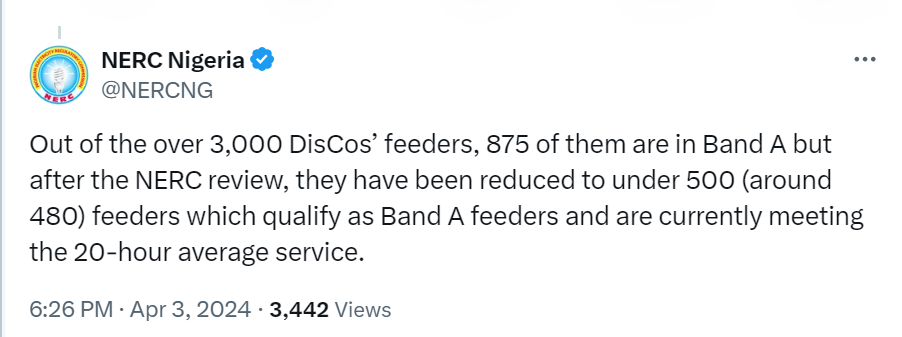On April 3, 2024, the Nigerian Electricity Regulatory Commission (NERC) implemented changes to the on-grid tariff system in Nigeria. The electricity tariffs were increased from an average of N66 to N225 per kilowatt hour.
This adjustment requires distribution companies (DisCos) to establish a rapid response team to ensure efficient delivery of services, specifically targeting the committed minimum hours of power supply to each service band, beginning with Band A feeders.
NERC’s directive states that if a DisCo fails to uphold the committed service level to a Band A feeder for seven consecutive days, the feeder will automatically be downgraded to the supply level recorded in the applicable framework.
Moreover, distribution companies must facilitate the continuous migration of customers from lower service bands to the Band A service level. This initiative aligns with the overarching goal of enhancing service quality.
It is worth noting that the revised electricity tariff primarily impacts users in MD and non-MD categories within Band A across all DisCos. However, there’s an exception for Band B non-MD users under Ikeja DisCo (Ikeja Electric), where the cost per kilowatt has marginally increased from N62.48 to N63.17 (1%).
For clarity, MD refers to Maximum Demand, which denotes the power consumption of large companies and factories, while non-MD refers to Non-Maximum Demand, indicating regular household power consumption.
Following the tariff hike notice on April 3, Nigerians have focused on the new cost of electricity, which will eventually extend from Band A customers to other bands. However, the focus should be on service quality.
Service-based tariffs were introduced in 2020, and since then, customers have not received the stipulated electricity supply they are entitled to despite paying for them for years.
Odion Omonfoman, the Chief Executive Officer of New Hampshire Capital Limited, told the Electricity Hub that out of 875 Band A feeders, NERC downgraded 395 feeders for not meeting the 20-hour service.

He said: “This means that the DisCos were billing and collecting Band A tariffs from customers on these feeders without providing the hours of service. This also means that the Federal Government was paying electricity subsidies for Band-A tariffs that it should not have paid.”
Omonfoman recommended a national probe on the issue because service quality has to be a part of the conversation about whether Nigerians will receive an improved power supply.
Note that Order Number NERC 2023/003, issued by the Nigerian Electricity Regulatory Commission (NERC) in May 2023, titled; “Order on Migration of Customers and Compensation for Service Failure Under Service Based Tariff Framework”, gave certain conditions for service-based tariffs. One of the conditions given was customer compensation due to service failure.
A part of the Order stated;
“The following procedure shall apply in the determination of customer compensation where a DisCo fails to meet the committed service levels as provided in the tariff order or following a migration of a feeder to a different service level –
“a. The Commission shall, on a monthly basis, evaluate the average availability of the 11kV and 33kV feeders as measured by the average number of hours of electricity supplied by a DisCo per day over 1 (one) month.
b. Where it is established that the service level on any feeder in band(s) “A” to “D” has failed to meet up to 90% of the committed service levels within one (1) month, the customers on the affected feeder(s) shall be compensated.
While cost undoubtedly plays a significant role in discussions about electricity tariffs, it is crucial to emphasize the importance of service quality. Nigerians need to understand the service bands they belong to and should hold their DisCos and NERC accountable for ensuring efficient service provision, especially considering their consistent payment of electricity bills.